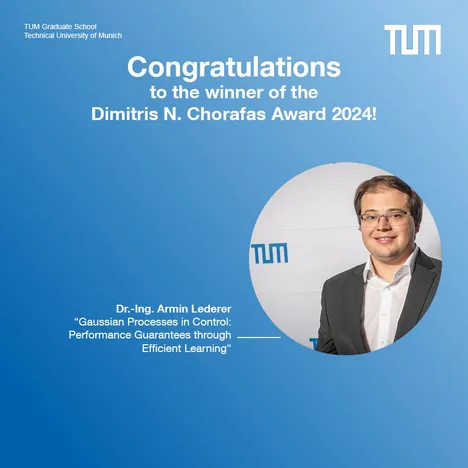International renowned dissertation award for former TUM Graduate School doctoral candidate
Aktuelles |
The Dimitris N. Chorafas Foundation yearly awards outstanding young doctoral researchers from top-ranking universities worldwide in selected fields in engineering, medicine and the natural sciences with the Dimitris N. Chorafas Prize. The prestigious prize rewards research characterized by its high potential for practical application and by the special significance attached to its aftermath. Each year, the Technical University of Munich (TUM) may nominate up to two exceptional doctoral graduates for the Prize. This year we would like to announce one winner of the prize:
Dr.-Ing. Armin Lederer, M.Sc. is awarded with the Dimitris N. Chorafas Prize 2024 for his thesis “Gaussian Processes in Control: Performance Guarantees through Efficient Learning.”
Armin Lederer obtained his Bachelor’s and Master’s degrees in Electrical and Computer Engineering at the Technical University of Munich (TUM). He then pursued his doctoral research in the area of control theory at the Chair of Information-oriented Control, TUM School of Computation, Information, and Technology, under the supervision of Prof. Dr.-Ing. Sandra Hirche. He received his doctoral degree in 2023 with summa cum laude and is currently working as a post-doctoral researcher at ETH Zurich.
In his outstanding dissertation “Gaussian Processes in Control: Performance Guarantees through Efficient Learning” he developed algorithms for ensuring the safety of intelligent autonomous systems. He achieved this by devising novel machine learning algorithms to infer models during the operation of autonomous systems and quantifying the uncertainty in the learning process resulting from limited data. He designed control algorithms that flexibly adapt their robustness to the model uncertainty to guarantee the safe operation of such learning autonomous systems, which have been applied in robotic rehabilitation and underwater robotic scenarios. With his doctoral research resulting in 30 international publications in machine learning, robotics and control theory venues, his interdisciplinary research has made a significant impact to the field of safe learning systems. In his future research, he wants to push the limits of safe intelligent systems toward increasing their practical applicability, flexibility and scalability.
